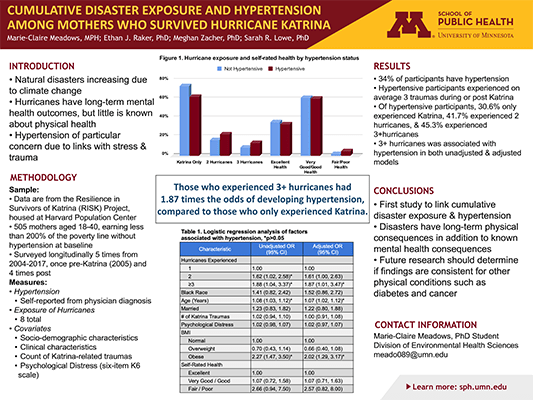Marie Claire Meadows
PhD, Environmental Health
Co-Authors:
Noelle Serino, Meghan Zacher, Ethan J. Raker, Sarah Lowe
Advisor:
Jesse Berman
Keywords:
Hurricanes, hypertension
Abstract
Cumulative exposure to multiple natural disasters has been linked to mental health, but less is
known about its association with physical health outcomes. Few studies explore hypertension
following multiple traumatic exposures. To address this gap, we used data from the Resilience in
Survivors of Katrina (RISK) Project, a longitudinal cohort of primarily Black, low-income
mothers who experienced Hurricane Katrina. We focused on 505 mothers without hypertension
prior to Katrina, but provided hypertension diagnosis data in at least one subsequent survey over
the next 12 years. Participants had experienced up to 7 hurricanes following Katrina. About 80%
of participants had only experienced Katrina, 13% had experienced Katrina and one other
hurricane, and 7% had experienced 3 or more hurricanes. Approximately 34% had been
diagnosed with hypertension following Katrina. In an unadjusted logistic regression model,
experiencing 2 hurricanes was associated with 1.62 times the odds of hypertension (95% CI:
1.02-2.58) and experiencing 3 or more hurricanes was associated with 1.88 times the odds of
hypertension (95% CI: 1.04-3.37). Adjusting for race, age, marital status, BMI, self-rated health,
Katrina traumas, and psychological distress, experiencing 2 hurricanes was associated with 1.61
times the odds of hypertension (95% CI: 1.01-2.63) and 3 or more hurricanes was associated
with 1.87 times the odds of hypertension (95% CI: 1.01-3.47). These findings provide evidence
that cumulative disaster exposure is associated with physical health consequences and indicate a
need for continued care for individuals in disaster-prone areas.

View Poster (PDF)
